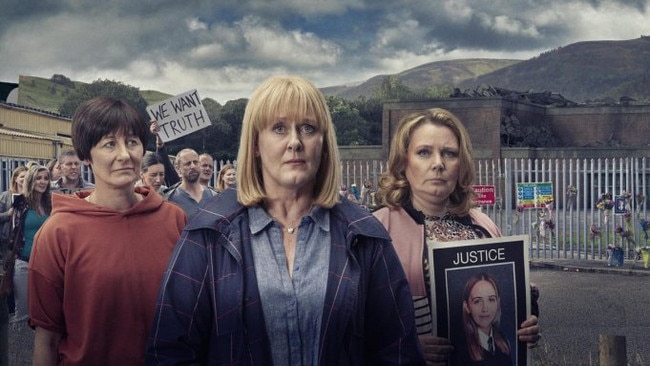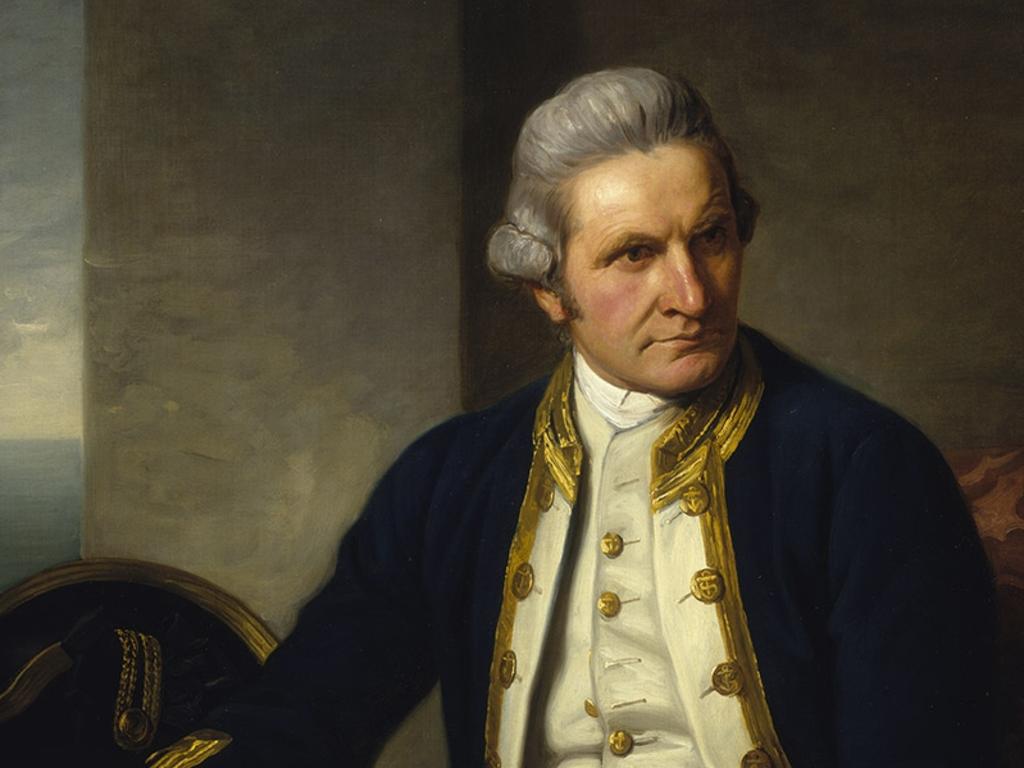The Accident: Children are dead. What happens next is must-see TV
The Accident, a compelling British four-part miniseries, is certainly provocative and exposure is at its core. It’s disturbing viewing.

The Accident, a compelling British four-part miniseries, is the third episode in a loose trilogy written by the accomplished BAFTA award-winning writer Jack Thorne. It joins National Treasure, his fictional story of a washed-out entertainer facing historical sex allegations, and the more recent Kiri, in which Thorne’s dramatic universe was the caring profession and the problems of being morally responsible for the vulnerable, a story centred on a child’s abduction.
While the prolific writer has a reputation for controversial TV dramas, often referred to as “the gritty chronicler of disaffected Britain” or words to that effect, Thorne is equally at home in the theatre, responsible for the phenomenally successful theatre production of Harry Potter and the Cursed Child. But there’s no doubt his TV dramas have cut through to much larger international audiences.
“I do think television is amazing,” he recently told the Financial Times. “Empathy is such a powerful tool and if you can tell a story which allows people to reflect on the world we live in and maybe provokes them a little bit, then that’s all I want to do. I want to be the guy provoking people.”
But in the same interview the most produced British TV writer of the past decade or so also pondered whether there was a certain DNA, a governing principle in his work. “I hope it’s about how we help each other, because that’s what I’m always trying to work out,” he said. “It’s not about everyone hugging each other. It can just be about exposing something.”
Well, The Accident is certainly provocative and exposure is at its core. It’s disturbing viewing.
Produced for Britain’s Channel 4 — like the other dramas in this trilogy — it is also about finger-pointing, culpability, the heavy weight of blame, and the way people deal with accusation. And once again Thorne and his director, this time the up-and-coming Sandra Goldbacher, develop another socially purposeful drama that is also a tightly structured mystery. As is Thorne’s way, he establishes context, characters and a plot in the economically written first episode that will obviously splinter and fracture in many unexpected ways as the narrative plays out.
At its centre, as was the case in Kiri, is the exemplary Sarah Lancashire, an actress of credibility and empathy, as Polly, the local “busybody” hairdresser in the Welsh town of Glyngolau. A devoted mother to her rebellious and promiscuous daughter Leona (Jade Croot) she’s the loyal wife to local politician and leader of Glyngolau Council, Iwan (Mark Lewis Jones). The town is a small hamlet hemmed in by foreboding hills, which has known some bad times, long deserted by heavy industry and commerce. The town is fictionalised, though Thorne said he has spent much of his life in and around Wales.
“Those valley towns have been decimated by the industrial changes we have had in the last 30 years and there is no industry left,” he said. “So I tried to think of an area where investment would be encouraged to a degree that would allow us to tell the story that we wanted to tell.”
So we are presented with a miracle at the start of the drama. Benevolent investors are promising to resurrect and generally socially and commercially revive the threatened township with the new partly built development called The Light. It promises to “bring a bright, new future to the region”, according to the signs posted around the huge site.
The town has united for a fun run in celebration, two laps of the town road, the emerging new construction a symbol of future good times.
Before the start they are addressed by the town’s top banana, Iwan Bevan, dressed appropriately in a yellow banana costume, reminiscent of a long-forgotten vaudeville show. “It suits you, Dad, you look like a real prick,” his daughter tells him before he leaves their house, certainly no love lost there we quickly gather, an early plot point.
But nothing holds Bevan back, having been it seems involved in negotiating the deal for the massive development. “There have been bad times,” he tells the assembled crowd.
“But Glyngolau is going back to what it was, what it should be.”
Warming up he gets to the point: “It’s more than about money in our pockets; it’s about smiles on our faces and a thousand new jobs and that’s a thousand new smiles.”
But as the townsfolk begin their run, or walk in many cases, a sense of jubilation in the smoky air, Leona has other plans. She quickly gathers a number of her friends together and they scale the perimeter fence through the loosely strung barbed wire and begin exploring the property. They pull out spray cans as they run around, moving in an eerie rhythm lit by skylights, and begin to apply graffiti with some enthusiasm.
The villagers lapping their town suddenly halt as they hear an earth-shaking explosion, followed by a shattering building collapse — violent and rapid. It’s like a bomb exploding. It’s shot with an electrifying viscerality by Goldbacher’s cinematographer Ashley Rowe, with all the raw intensity of an action movie. The villagers rush to the smoking and burning building as another larger explosion is ignited. Then it’s as if the road turns into a treadmill, an endless concrete ribbon with no ending. They watch as bodies are excavated from the debris, eight teenagers dead, only Leona survives with terrible injuries.
As the first fraught episode concludes Thorne leaves us with many questions. Are the corporate-caused deaths accidental, as slick executive Harriet Paulsen (Sidse Babett Knudsen), the public face of Kallbridge Development, owner of The Light, suggests? (Polly confronts her at the scene. “This was done as cheap as chips and you know it,” she shouts.) What was Polly’s husband’s role in the disaster? And especially what will happen to her daughter when the facts emerge as to her involvement? Who will be blamed? Will anyone in fact be held responsible at the highest level?
The Accident is not, in fact, based on any real event though as Thorne explained on the Channel 4 website, the series makers “spent a long time researching everything and constructing an accident that felt real, which enabled our drama to do everything it needed to do”.
They thoroughly explored tragedies like the Grenfell Tower fire and the 1966 Aberfan disaster where a colliery tip collapsed on the Welsh village below, “the extraordinary thing we found was that none of them had led to anyone being in jail, which was an incredible statistic”.
Especially horrifying, he added, “was that Grenfell happened in a country as developed and seemingly as rich as ours”.
As a writer, Thorne has a gift for posing cultural and moral questions that not only confound and confront but entertain in the most commendably adult way, his scripts always weighty vehicles for actors. As Babett Knudsen — the Borden star terrific here as the morally conflicted face of capitalism — says, it’s difficult these days in TV to find the voice of an actual author in a script. “It’s very often a set of people writing, a room of people, and there was a very personal voice which to me makes it feel like we’re doing cinema,” she said. “It all comes from one place, from one storyteller who has definitely a vision that is very large and so you feel you’re walking into a universe that exists, not something that we shall make work.”
In this trilogy, Thorne has dramatised some of the weightiest subjects in contemporary culture and broadened and amplified the debate around them. And in The Accident the way he weaves the personal tragedies, the interpersonal themes, with the unifying social calamity is done seamlessly. He has a gift for parallel plotting, none of the threads leading to the usual fabricated dead ends but eventually all tied to the central event.
And it’s beautifully and sensitively handled by Goldbacher who, while her direction is carefully stylised, still finds room for developing small comic moments from her ensemble cast.
As a director she works between TV (Endeavour, Victoria, Poldark) and high-end TV advertisements and is conscious, the way commercial directors are, of the importance of each image and each frame. Ridley Scott, as significant for his work in commercials as in features, once said: “I was always amazed about how much I could finally squeeze into a 30-second commercial.”
And that is the way Goldbacher works, whereas so many TV directors still work as though they are filming a radio play. She places her cameras in interesting, often unexpected positions and uses clever architectural framings, through doorways and windows, or places her actors behind solid objects, filming around them so there is always visual depth in the compositions.
The Accident is taut, humane in its coverage of ghastly events, intelligently constructed and sharply executed. And very well acted.
The Accident, Friday, ABC, 9.30pm.


